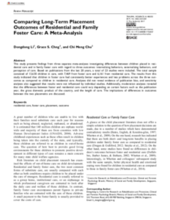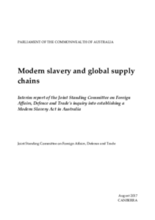Displaying 791 - 800 of 1482
This study presents findings from three separate meta-analyses investigating differences between children placed in residential care and in family foster care with regard to three outcomes: internalizing behaviors, externalizing behaviors, and perception of care.
This report reviews the existing literature on the impact of child sexual abuse within various types of institutional care settings around the world.
This document includes the general comments adopted by the United Nations Committee on the Rights of Persons with Disabilities on Article 19 of the Convention: the right to live independently and being included in the community.
This paper reports the findings from a study investigating the priorities of care-leavers who arrived in England or Sweden as unaccompanied minors.
This interim report from the Parliament of Australia's Joint Standing Committee on Foreign Affairs, Defence and Trade presents its recommendations on the adoption of a Modern Slavery Act in Australia, with consideration to the trafficking, forced labor and child exploitation through orphanage tourism.
On 17 August 2017, the Australian Foreign Affairs and Aid Sub-Committee was briefed by representatives from the Cambodian Children’s Trust and Forget Me Not Foundation on the issue of orphanage tourism. This link includes a video of the opening statements from this briefing.
This article explores the perspectives and programme needs of transition service providers (institutions and the government) in preparing and supporting adolescent girls leaving institutional care in Harare, Zimbabwe.
This article explores the perspectives and programme needs of transition service providers (institutions and the government) in preparing and supporting adolescent girls leaving institutional care in Harare, Zimbabwe.
This report presents the findings from a secondary analysis of data from a comprehensive intervention in three baby homes in St. Petersburg, Russian Federation. The analysis examined whether caregiver-child interaction quality, number of caregiver transitions, and group size mediated the impact of intervention on children's attachment behaviors and physical growth.
This paper presents the findings from a population-based, multi-stage random cluster knowledge, attitudes, and practices (KAP) survey of child caregivers in Liberia, revealing the primary reasons for parent-child separation and common misconceptions about alternative care.




